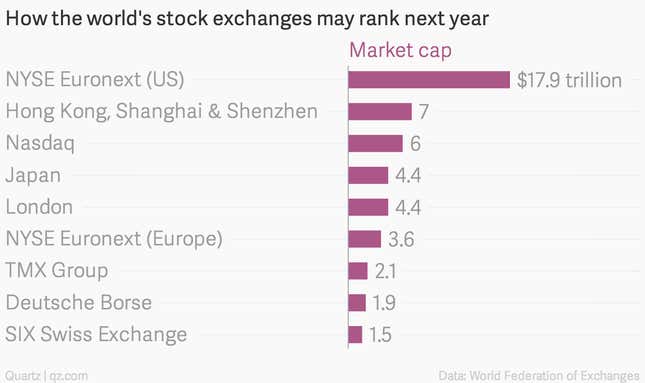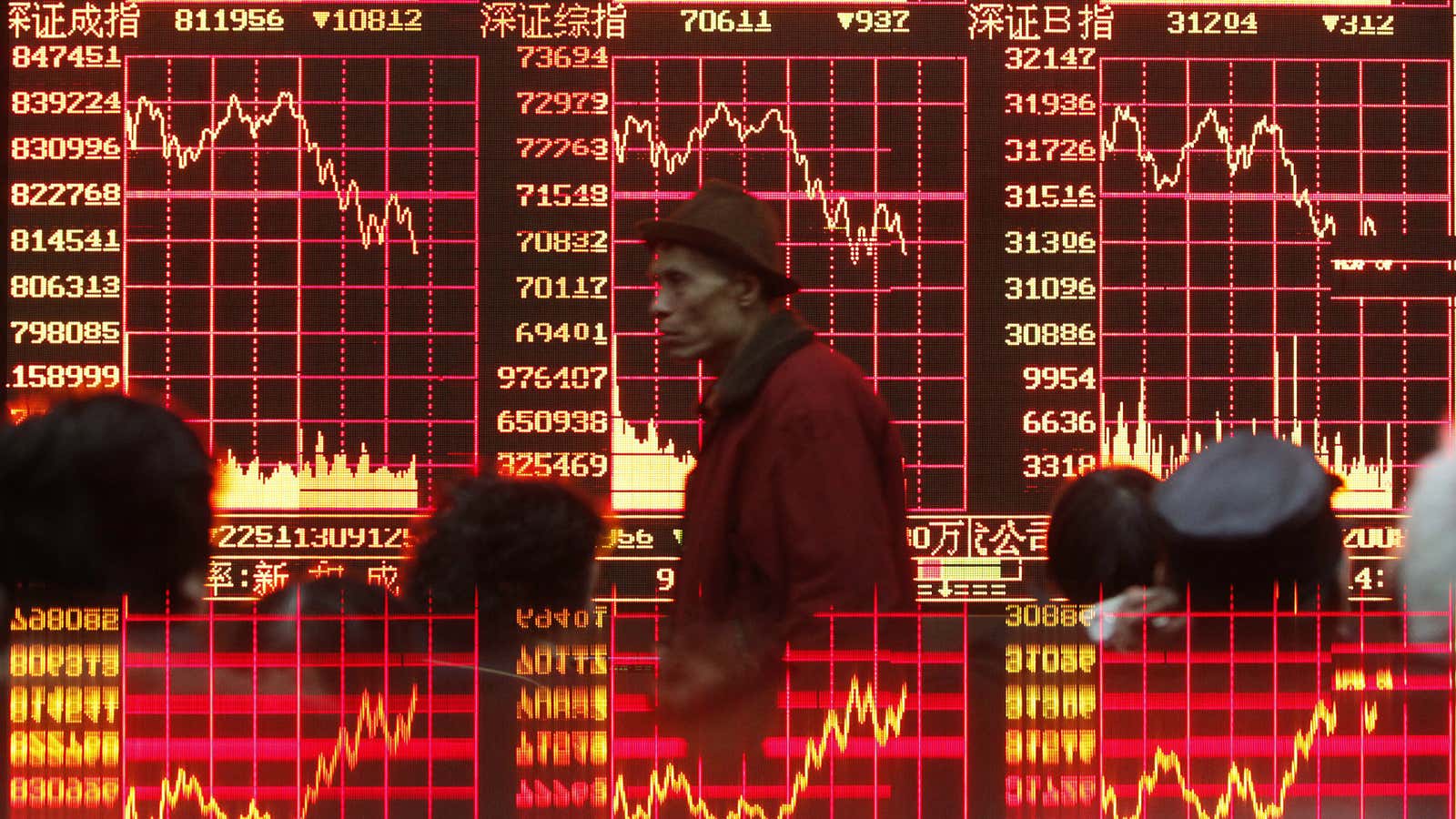HONG KONG – It’s been a bumpy ride beset by delays and last-minute clarifications, but today marks the start of trading in the much-anticipated Shanghai-Hong Kong Stock Connect, or as it’s known colloquially, “the through-train.”
This landmark agreement between the Shanghai and Hong Kong Stock Exchanges will give foreign investors direct access to Shanghai-listed shares through the Hong Kong stock exchange for the first time. Mainland investors that meet a minimum asset requirement will also be able to trade Hong Kong-listed shares through the Shanghai stock exchange.
Previously, foreign investors were only able to invest directly in Chinese stocks listed on the Hong Kong exchange, known as H shares, or through a very restrictive “qualified foreign institutional investors” plan.
Stock Connect immediately creates one of the largest stock markets in the world, with a combined market cap of $5.6 trillion (pdf, pg. 37). And when the Shenzhen Stock Exchange joins Stock Connect next year, the combined exchange would be the world’s second largest, just behind the NYSE.

Starting today, any investor with a broker in Hong Kong, be they a hedge fund, a high net worth individual or a mum or dad from Minnesota, can now invest directly in any of the 568 Chinese companies listed on the Shanghai stock exchange. Friday’s announcement by the Chinese Ministry of Finance that foreign investors will be exempt from paying capital gains tax, albeit for an unspecified period, makes it even more attractive.
But just because nearly anyone can now invest in Shanghai-listed companies doesn’t mean everyone should. Chinese economist Wu Jinglian famously described the exchange as “worse than a casino” more than a decade ago, and it is hard to find evidence that the situation has improved substantially since.
Of great concern, particularly for retail investors and pension fund managers with limited experience in Asian markets, are the often questionable standards of corporate governance in Chinese companies. That goes hand-in-hand with high levels of corruption that, as Xi Jinping’s recent clamp-down has shown, reaches the highest levels of government.
Philippa Allen, CEO of the consulting group ComplianceAsia, said “inherent non-compliance” among companies listed on the Shanghai stock exchange is the most fundamental problem Stock Connect faces.
“You’ve got massive amounts of insider dealing, massive amounts of manipulation in that market,” she said. “There’s no sense of governance and there will be some firms that choose not to be involved with it.”
Damien Horth, Asia Pacific head of research at Swiss bank UBS, warned that governance and regulatory matters are always going to be an issue in developing markets like China. “Any investor needs to go into an opportunity like this with their eyes wide open,” he said.
Fraud is not only prevalent, it is often long-running. Last year, regulators found that Wanfu Biotechnology Agricultural Development had overstated its financials for four years in a row, adding 740 million yuan ($120 million) to is revenues. Another biotechnology company, Yunnan Green-Land Biological, faked its assets and revenues for three years in a row before being caught.
China’s regulators have tacitly acknowledged that the Shanghai exchange has troubles with transparency. The Chinese Securities Regulatory Commission (CSRC) suspended all new IPOs for a 14 month period in 2012 while it worked on a new registration system to prevent the wide-scale fraud that was plaguing new listings. Ping An Securities, which brought Wanfu to the market, had its underwriting privileges halted for three months after the fraud came to light.
Stock Connect also poses custody and settlement issues for investors on both sides of the market. In a possible attempt to limit day trading, investors cannot buy and sell a given stock on the same day. Daily and aggregate quotas will also cap trading on both sides, although many analysts believe these will eventually be removed.
Still, the through train that starts running today marks a monumental change in the Chinese government’s regulation of its financial markets. “China doesn’t do things on gut instinct,” said Chris Jenkins, Asia Pacific managing director of the trading technology group Tora. “It has a plan, and this is the start of the opening up of China’s capital markets to foreign investment.”
Horth was even more effusive about the opportunities. “I don’t think there has been a time in my professional career, and that’s 25 years, where investors have seen a market of this size and opportunity open up,” he said.
The government is trying to push forward with market reforms and anti-corruption campaigns, and many market analysts believe that new institutional money being invested in Shanghai stocks may ultimately improve transparency and regulatory standards. Allen warned, however, that this “won’t happen overnight.”
